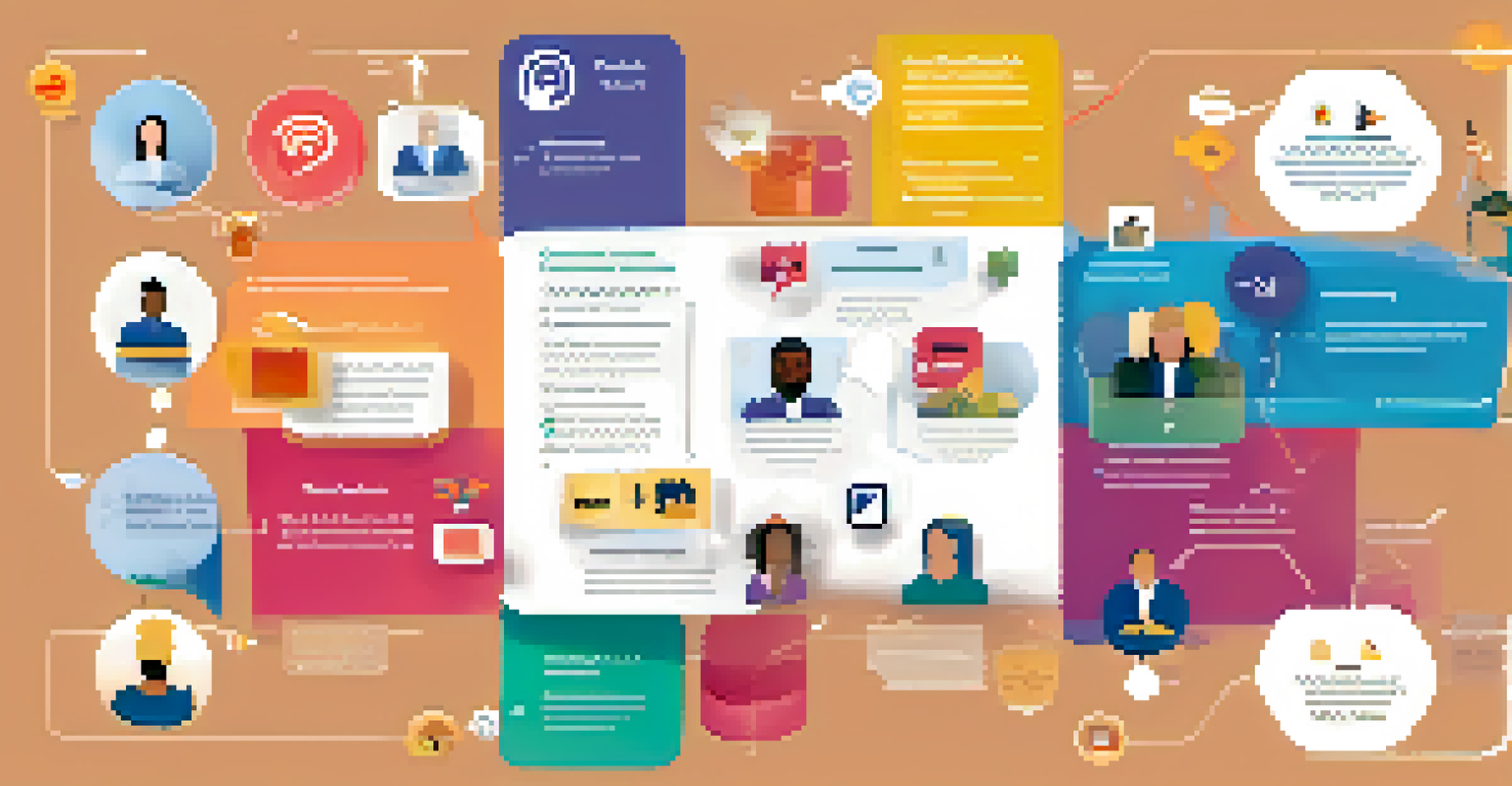Navigating Cultural Differences in Remote Teams

Understanding Cultural Differences in Remote Work
Cultural differences can significantly impact communication and collaboration in remote teams. Each team member brings their unique background, values, and working styles, which can lead to misunderstandings if not acknowledged. Recognizing these differences is the first step towards fostering a harmonious work environment.
Diversity is not a reason for division. It is a reason for unity.
For instance, a direct communication style may be appreciated in some cultures, while others might find it abrasive. By understanding these nuances, teams can create guidelines that respect each member's preferences, ensuring everyone feels valued. This foundational knowledge sets the stage for effective teamwork.
Ultimately, embracing cultural diversity not only enhances team dynamics but also enriches the overall work experience. The more we learn about each other's cultures, the better equipped we are to collaborate and innovate together.
Building Trust Across Different Cultures
Building trust in remote teams often takes extra effort, especially when cultural differences come into play. In some cultures, trust is established through personal relationships, while in others, it may stem from professional competence. Recognizing these varying approaches can help teams establish stronger connections.

A great way to build trust is through regular check-ins and open conversations about expectations. For example, scheduling informal virtual coffee breaks can offer team members a chance to share personal stories and connect on a human level. This can foster a sense of belonging, which is crucial for building trust.
Embrace Cultural Differences
Recognizing and respecting cultural differences enhances remote team dynamics and fosters effective collaboration.
In the long run, a trusting environment encourages team members to voice their ideas and concerns without fear of judgment. Cultivating this trust not only improves collaboration but also leads to a more productive and innovative team.
Effective Communication Strategies for Diverse Teams
Effective communication is the backbone of any successful remote team, especially when navigating cultural differences. It's essential to establish clear communication channels and protocols that everyone understands. This could include using tools like Slack for messaging or Zoom for video calls, ensuring everyone is on the same page.
The strength of the team is each individual member. The strength of each member is the team.
Moreover, being mindful of language barriers can make a significant difference. Encourage team members to ask for clarification when needed and to avoid idioms or jargon that may not be universally understood. By prioritizing clarity, teams can minimize miscommunication and enhance collaboration.
Lastly, taking the time to summarize key points at the end of meetings can help reinforce understanding. This practice not only ensures everyone is aligned but also demonstrates respect for diverse communication styles within the team.
Encouraging Cultural Awareness and Sensitivity
Promoting cultural awareness and sensitivity is vital in fostering a cohesive remote team. This can be achieved through training sessions that educate team members about each other’s cultures, traditions, and customs. Understanding different cultural practices can enhance empathy and cooperation.
For example, celebrating cultural holidays or hosting cultural exchange sessions can be a fun and engaging way to learn about each other. This not only enriches the team's experience but also shows respect for each individual's background, creating a more inclusive environment.
Build Trust Through Connection
Establishing trust in diverse teams is achieved through open communication and informal interactions that promote personal relationships.
In this way, teams can transform cultural differences into strengths, leveraging diverse perspectives to drive creativity and innovation. A culture of awareness leads to a more harmonious workspace and a stronger sense of unity.
Setting Clear Expectations and Goals
When working with diverse teams, setting clear expectations and goals becomes even more crucial. Different cultures may have varying approaches to deadlines, feedback, and work-life balance. By clearly outlining what is expected, teams can align their efforts and avoid potential conflicts.
For instance, using SMART goals (Specific, Measurable, Achievable, Relevant, Time-bound) can help create a shared understanding of objectives. This framework ensures that everyone knows their roles and responsibilities, reducing ambiguity and enhancing productivity.
Additionally, regularly revisiting these goals together fosters a sense of accountability and collaboration. When everyone is on the same page, the team can focus on achieving results rather than navigating misunderstandings.
Utilizing Technology to Bridge Cultural Gaps
In our digital age, technology plays a pivotal role in bridging cultural gaps in remote teams. Tools like video conferencing, project management software, and collaboration platforms enable seamless communication and coordination. When used effectively, technology can bring diverse team members closer together.
For instance, using visual aids during presentations can help convey ideas more clearly across language barriers. Similarly, leveraging collaboration tools like Trello or Asana can help track progress and responsibilities in an organized manner, making it easier for everyone to contribute.
Leverage Technology for Teamwork
Utilizing the right technological tools can bridge cultural gaps and streamline communication in remote teams.
Ultimately, the right technological solutions can enhance engagement and streamline workflows, allowing teams to focus on what truly matters: collaboration and innovation.
Celebrating Diversity and Team Achievements
Celebrating diversity and team achievements is essential for maintaining morale in remote teams. Recognizing individual contributions and cultural backgrounds fosters a sense of belonging and appreciation. This can be as simple as acknowledging a team member's birthday or their cultural festivities during team meetings.
Moreover, celebrating milestones, whether big or small, reinforces the team’s collaborative spirit. Sharing successes publicly, like achieving a project goal, can motivate team members and encourage them to continue contributing their best efforts.

Incorporating these practices not only strengthens relationships within the team but also builds a positive and inclusive work culture. When team members feel valued and recognized, they are more likely to be engaged and committed to the team's success.